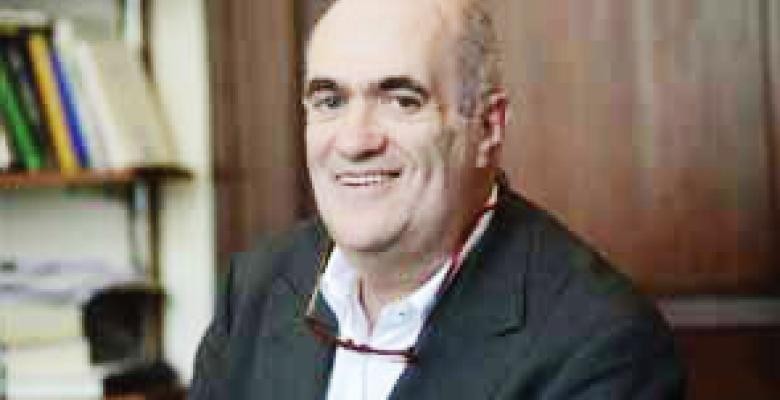Mellon Professor Colm Tóibín Imagines the Life of Mary in Play on Broadway

Irish author Colm Tóibín is known for his novels and short stories narrated from the perspective of women and mothers.
Now the professor of English and comparative literature has taken on the mother of all mothers in his latest work, a play about the Virgin Mary.
The idea for "The Testament of Mary" came about at a late-night Christmas party in Dublin in 2008. Chatting with friends about the dearth of female-centered narratives, Tóibín suggested that the mother of Jesus is a historical woman who had never been written as a strong, standalone character. One of those present was Loughlin Deegan, then the director of the Dublin Theatre Festival. “Would you write that for us?” he asked.
Two years later, "The Testament of Mary" was performed at the festival as a monologue in which Mary tells her version of her son’s life story, becoming another of the strong women who populate Tóibín’s work. One short story collection is titled "Mothers and Sons" and another, "New Ways to Kill Your Mother," explores family relationships of writers. It’s all part of a deliberate effort by the playwright to right a historical wrong by creating more strong women in literature and on stage.
“What a pity it is that we don’t have more,” said Tóibín. “We have Medea and we have Electra, and we have a few others, but it would be great if we have some more. You have difficulties if you’re a certain sort of actress. There are only a few of those parts you can play because so many of the texts are lost.”
Tóibín then expanded the play into a novella, which was published in 2012 and caught the eye of Tony and Oscar-winning producer Scott Rudin. “As soon as Scott Rudin saw it, he remained steadfast in wanting to put it on stage in New York,” said Tóibín. “He has been remarkable in that respect. In other words, he has never wavered.”
"The Testament of Mary" opens on Broadway on March 26, starring renowned Irish actress Fiona Shaw and directed by Deborah Warner, who previously collaborated on 2002’s "Medea." “I think I’ve seen everything they have done, and there is a way in which they work—a sort of commitment to theater that is totally exciting,” he said. “They both have a remarkable talent.”
For Tóibín, the process of writing for the stage, then in novella form, and then adapting it back into a play required three separate versions. The adaptation from novella to Broadway stage required cutting the text by more than half and changing its style to fit the rules of theater.
Such versatility is critical for an author and figures in Tóibín’s role at Columbia, which he joined in spring 2012 as the Irene and Sidney B. Silverman Professor of the Humanities. He is one of five Andrew W. Mellon Foundation Professors in the Humanities, funded faculty appointments created to attract humanities scholars with a wide range of intellectual pursuits. “The idea leading to the creation of the Mellon professorships was impressive and inspiring, though not nearly as impressive and inspiring as the reality of having Colm Tóibín and his fellow Mellon professors join the Columbia faculty,” said President Lee C. Bollinger.
Tóibín’s fellow Mellon professors are writers Richard Ford and Orhan Pamuk, a Nobel laureate in literature, philosopher Axel Honneth and feminist scholar Judith Butler.
Tóibín is currently teaching a class on Irish prose to undergraduates and another one examining the late 19th century novel to graduate students.
Given the attention the play has already garnered—including a column by "New York Times" columnist Maureen Dowd—Tóibín is aware of the balance he must strike between his work on campus and off.
“The main function of the academy is to connect students. That is your first job—to truly make a difference to these young people that will affect their lives,” said Tóibín. “But you also have a second duty—to have a relationship to the outside world so that what you are writing, what you’re thinking about, can matter and have an effect on the way people read or the way people think in the wider world.”